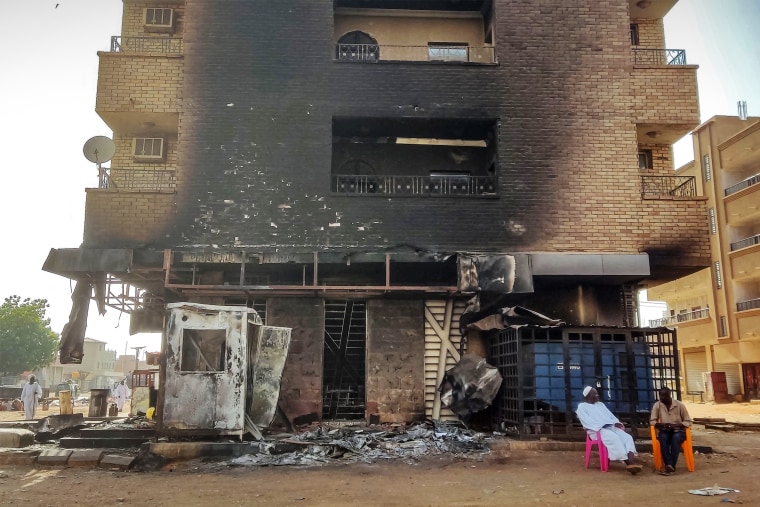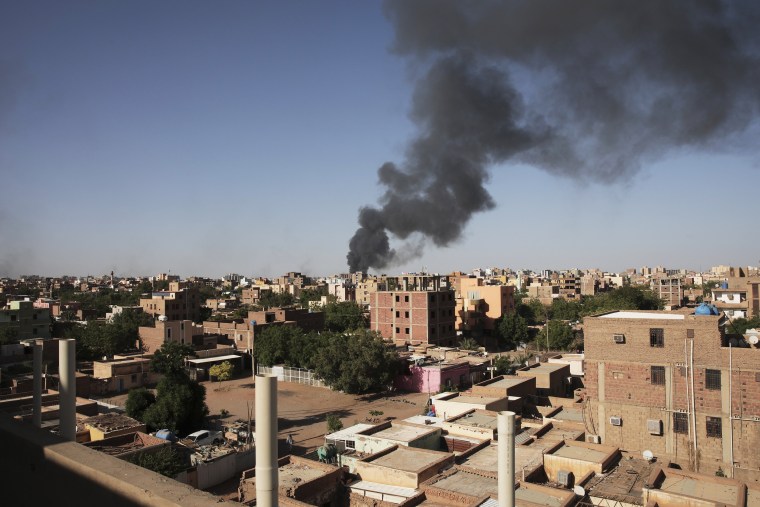A year into Sudan’s civil war, Iranian-made armed drones have helped the army turn the tide of the conflict, halting the progress of the rival paramilitary Rapid Support Force and regaining territory around the capital, a senior army source told Reuters.
Six Iranian sources, regional officials and diplomats- who, like the army source, asked not to be identified because of the sensitivity of the information — also told Reuters the military had acquired Iranian-made unmanned aerial vehicles (UAVs) over the past few months.
The Sudanese Armed Forces (SAF) used some older UAVs in the first months of the war alongside artillery batteries and fighter jets, but had little success in rooting out RSF fighters embedded in heavily populated neighborhoods in Khartoum and other cities, more than a dozen Khartoum residents said.
In January, nine months after fighting erupted, much more effective drones began operating from the army’s Wadi Sayidna base to the north of Khartoum, according to five eyewitnesses living in the area.
The residents said the drones appeared to monitor RSF movements, target their positions, and pinpoint artillery strikes in Omdurman, one of three cities on the banks of the Nile that comprise the capital Khartoum.
“In recent weeks, the army has begun to use precise drones in military operations, which forced the RSF to flee from many areas and allowed the army to deploy forces on the ground,” said Mohamed Othman, a 59-year-old resident of Omdurman’s Al-Thawra district.

The extent and manner of the army’s deployment of Iranian UAVs in Omdurman and other areas has not been previously reported. Bloomberg and Sudanese media have reported the presence of Iranian drones in the country.
The senior Sudanese army source denied that the Iranian-made drones came directly from Iran, and declined to say how they were procured or how many the army had received. Reuters was unable to determine those details independently.
The source said that while diplomatic cooperation between Sudan and Iran had been restored last year, official military cooperation was still pending.
Asked about Iranian drones, Sudan’s acting foreign minister Ali Sadeq, who visited Iran last year and is aligned with the army, told Reuters: “Sudan did not obtain any weapons from Iran.”

The army’s media department and Iran’s foreign ministry did not respond to requests for comment.
The RSF acknowledged it had suffered setbacks in Omdurman. Its media office said the army had received Iranian drones and other weapons, citing intelligence it had gathered. It did not respond to requests to provide evidence.
Tehran’s backing for Sudan’s army is aimed at strengthening ties with the strategically located country, the Iranian and regional sources said.
Sudan lies on the coast of the Red Sea, a key site of competition between global powers, including Iran, as war rages in the Middle East. From the other side of the Red Sea, Yemen’s Houthis, armed in part by Iran, have launched attacks in support of Hamas in Gaza.
“What does Iran get in return? They now have a staging post on the Red Sea and on the African side,” said a Western diplomat, who asked not to be named.
Recent territorial advances are the most significant for the army since the fighting began in Sudan’s capital last April.
The war, between army head General Abdel Fattah al-Burhan and RSF head General Mohamed Hamdan Dagalo, has pushed millions into extreme hunger, created the world’s largest displacement crisis, and triggered waves of ethnically driven killings and sexual violence in the Darfur region of western Sudan.
The RSF war effort has been aided, U.N. experts have said, by support from neighboring African states including Chad, Libya and South Sudan.
The army’s success in Omdurman allowed it from February to pursue similar attacks using drones, artillery and troops in Bahri, north of Khartoum, to try to take control of the key Al Jaili oil refinery, two witnesses there said.
The army has said that its recent gains have also been helped by recruitment — taking place over more than six months and accelerating since December — of thousands of volunteers in the areas it controls.
Flights from Iran
Cooperation between Sudan and Iran was strong under former President Omar al-Bashir, until he turned to Iran’s Gulf rivals for economic support late in his three-decade rule, cutting relations with Tehran.
Amin Mazajoub, a former Sudanese general, said Sudan had previously manufactured weapons with the help of Iran, and had repurposed drones already in its possession to make them more effective during the war. Mazajoub did not…
Read More: Are Iranian drones turning the tide of Sudan’s civil war?

